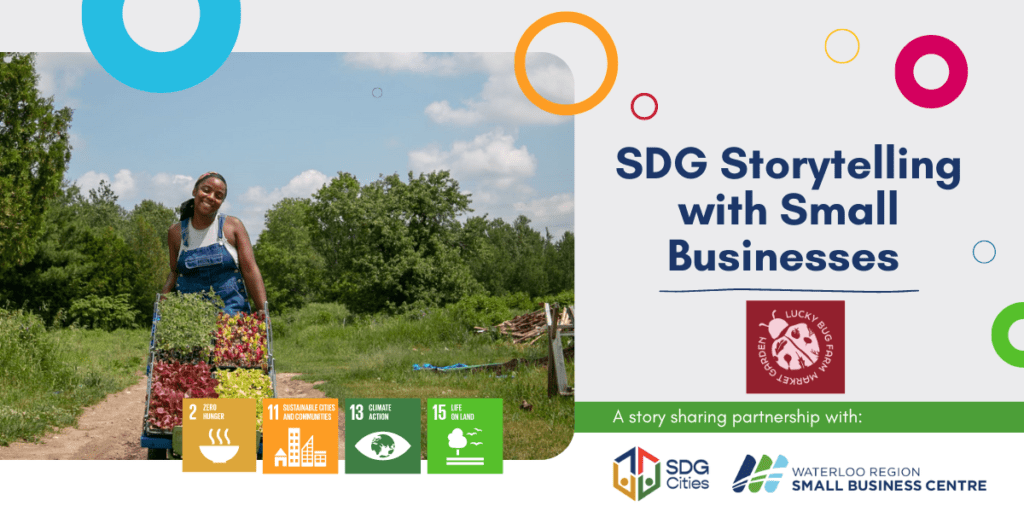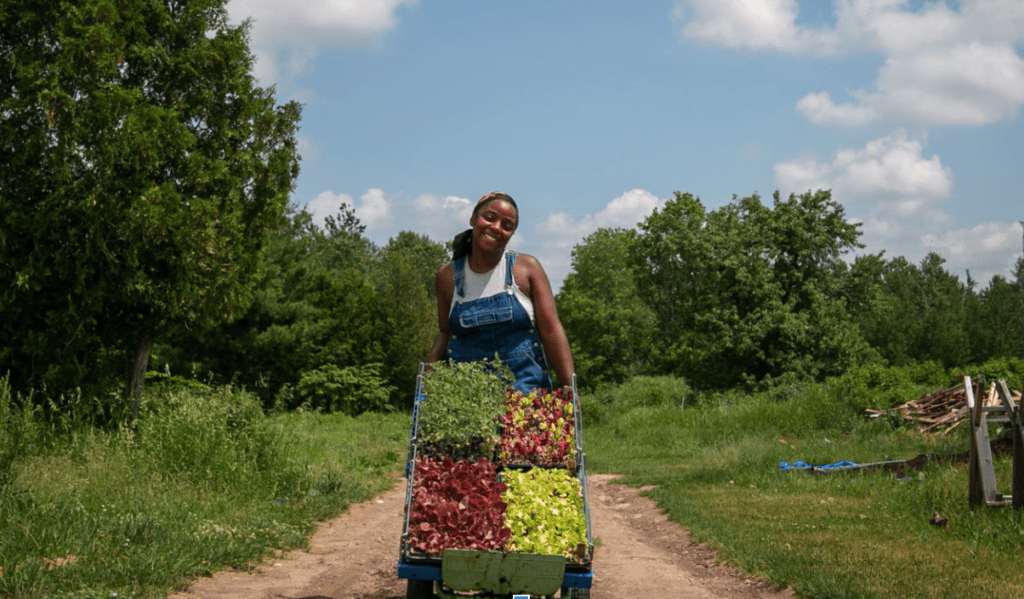From farm to table: the Lucky Bug Farm is transforming our perspectives on food!

This story is created and shared in collaboration with the Waterloo Region Small Business Centre, a valuable resource for entrepreneurs looking to start or grow their businesses in the Waterloo Region. Their expertise and support have been instrumental in providing insights and information for this post, highlighting the Centre’s commitment to fostering the entrepreneurial spirit in the community.
In early 2021, Aliyah Fraser (she/her) founded the Lucky Bug Farm with the aim of promoting fair and sustainable food systems in Southwestern Ontario. Her vision involves making ecologically grown food more accessible to her community, reducing food waste, and increasing awareness about existing supply chains that bring food from the farm to the table.
After graduating from Urban Planning and Environmental Studies from the University of Waterloo, Aliyah shifted her focus from urban planning to sustainable agriculture, motivated by the idea of making a direct positive impact on people’s lives through food. Initially inspired by her mentor Cheyenne Sundance, a self-taught farmer and the founder of Sundance Harvest Farm who started her own food and land sovereignty movements after experiencing discrimination at a young age, Aliyah began her journey as an advocate for the access to nutritious and sustainably produced food as a fundamental human right.

The Lucky Bug Farm and SDGs
Located on the traditional territory of the Neutral, Anishnaabeg, Haudenosaunee, and Mississauga peoples, the Lucky Bug Farm is a market garden that spans one quarter acre of land on which a variety of unique and fresh produce is grown. The farm is part of the Community Supported Agriculture (CSA) Program, meaning that members of the community can purchase a share of the harvest at the beginning of the growing season which helps farmers plan for the growing season. Lucky Bug Farm aims to make a positive impact on society and the environment by focusing on sustainable and ecologically-friendly farming practices. Therefore, it aligns its objectives with SDGs 11, 13, and 15.

For SDG 11 (Sustainable Cities and Communities), Lucky Bug Farm’s mission is to offer consumers access to locally grown produce, less reliant on the existing corporate food system that dominates large grocery stores. By providing transparency in the sourcing and production of their food, Lucky Bug Farm empowers individuals to know exactly where their food comes from and supports a more sustainable and community-driven food system.
The Lucky Bug Farm strives to establish a productive and ecologically sustainable environment by prioritizing interplanting and minimal tillage techniques that enhance soil health. Although the farm is not officially certified as an organic farm, it upholds its commitment to sustainability by exclusively purchasing organic seeds, using organic potting mix, and abstaining from synthetic amendments, sprays, or fertilizers. In many ways, the Lucky Bug Farm’s actions align with SDG 13 (Climate Action) and SDG 15 (Life on Land) by prioritizing the health of the ecosystem and the land on which it cultivates its produce. The farm not only demonstrates its commitment to respecting and preserving the environment, but also contributes to SDG 2 (Zero Hunger), with focus Target 2.4 (Sustainable Food Production and Resilient Agricultural Practices). Through the implementation of sustainable practices, the Lucky Bug Farm works towards a more sustainable food system.
In addition to its environmental efforts, the farm also recognizes and actively combats the systemic inequities within the corporate-run food system that disproportionately affect marginalized communities, including Black, Indigenous, and other racialized groups, the LGBTQ2S+ community, disabled individuals, and those with low income.
Partnerships and Future Vision
The Lucky Bug Farm has established informal partnerships with neighboring farmers who generously offer heated greenhouse space, enabling them to cultivate produce even through the colder months. Moreover, Aliyah actively sought out opportunities to learn from other women farmers, exchanging valuable knowledge and gaining insights into sustainable farming practices that she then incorporated into her own operations. Despite facing hard challenges along the way, Aliyah remains optimistic about the future of her business and community. She envisions a future where she can continue to make a tangible difference in the lives of her community through food and to inspire positive change in the local food system.
The Lucky Bug Farm grows a variety of unique and tasty produce including Tokyo Bekana, garlic scapes and Scotch bonnet peppers! To support the farm, please visit the its website at http://luckybugfarm.com
